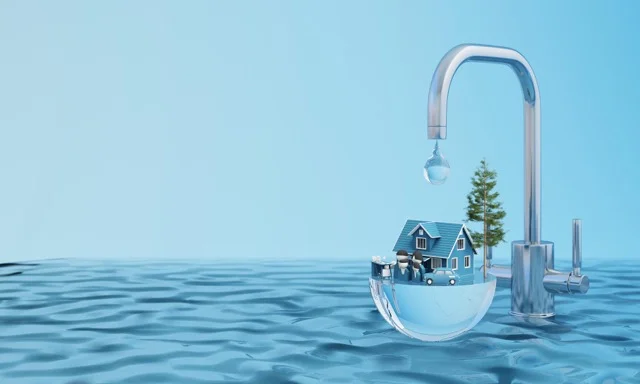Reclaim Waste Things To Know Before You Get This
Reclaim Waste Things To Know Before You Get This
Blog Article
The 10-Minute Rule for Reclaim Waste
Table of ContentsThe Reclaim Waste IdeasRumored Buzz on Reclaim WasteReclaim Waste Fundamentals ExplainedThe smart Trick of Reclaim Waste That Nobody is DiscussingThe Greatest Guide To Reclaim Waste
Check out the types, events, and types of liquid waste. Domestic sewer waste refers to the waste and products from a household septic container. This sort of waste is produced by human beings in residences, colleges, and various other buildings. This only consists of septic systems that have a drain area. The proper management and disposal of domestic sewage waste call for liquid waste to be moved to a sewer treatment plant where the correct methods and tools are related to detoxify and dispose of waste.
Commercial waste usually consists of potential dangers, such as combustible materials or a combination of liquid and strong waste products, and calls for a much more advanced and thorough disposal process. The disposal of business waste commonly includes the filtration of waste before transport to guarantee secure and appropriate disposal. Hazardous waste is developed from byproducts and drainage of commercial processes and manufacturing.
This type of waste can not make use of the very same sewage administration transportation or procedures as septic or business fluids. The hazardous waste management process needs the inspection and testing of liquid waste before it undertakes the disposal procedure (liquid waste disposal). Runoff waste is the liquid waste that originates from overflow and excess stormwater in very booming locations or cities
Drainage waste can cause contamination and flooding if not managed appropriately. Discover more concerning sewage system cleansing and waste management. Guaranteeing appropriate waste administration can protect against calamities and lower ecological damage. Both people in household setups and professionals in commercial or production industries can benefit from comprehending the procedures and regulations of fluid waste administration.
Examine This Report on Reclaim Waste
Contact PROS Providers today to find out about our waste administration and disposal solutions and the proper methods to look after the fluid waste you create.
(https://giphy.com/channel/reclaimwaste1)This so-called 'wastewater' is not just a vital source but, after therapy, will be launched to our land, waterways or the sea. Used water from commodes, showers, baths, cooking area sinks, laundries and commercial processes is understood as wastewater.

water used to cool down equipment or clean plant and tools). Stormwater, a type of wastewater, is runoff that streams from agricultural and metropolitan locations such as roofings, parks, gardens, roadways, courses and rain gutters right into stormwater drains pipes, after rain. Stormwater flows unattended directly to neighborhood creeks or rivers, eventually reaching the sea.
The Reclaim Waste Ideas
In Queensland, many wastewater is treated at sewage therapy plants. Wastewater is transported from domestic or industrial sites with a system of sewage systems and pump terminals, called sewage reticulation, to a sewer therapy plant. Neighborhood governments build, maintain and operate most sewer therapy plants. Operators are accredited under the Environmental Protection Act 1994 to discharge cured wastewater at an acceptable environmental requirement right into waterways.
The Department of Natural Resources suggests city governments concerning managing, operating and preserving sewage systems and therapy plants. In unsewered locations, regional governments might require homeowners to install individual or home sewage therapy systems to treat domestic wastewater from toilets, cooking areas, restrooms and washings. The Department of Natural Resources authorises making use of household systems when they are verified to be efficient.
In some brand-new subdivisions, treatment of some stormwater to remove clutter, sand and gravel has started making use of gross toxin catches. Wastewater treatment happens in four phases: Removes strong issue.
Utilizes small living microorganisms understands as micro-organisms to break down and get rid of remaining liquified wastes and great fragments. Micro-organisms and wastes are included in the sludge.
The Main Principles Of Reclaim Waste
Nutrient removal is not readily available whatsoever sewage therapy plants due to the fact that it needs costly specialized equipment. It is coming to be a lot more typical in Queensland. Clear liquid effluent produced after treatment might still include disease-causing micro-organisms. If this effluent is launched right into rivers such as rivers or the sea, the micro-organisms will at some point pass away out.

This generally implies wastewater needs to be dealt with or contaminants removed before it can be released to rivers. A lot of wastewater streams into the sewage system. Under the Act, city governments provide approvals and licences for eco appropriate activities (Periods) including wastewater releases that might have a neighborhood effect. The department carries out authorizations and licences to Periods entailing wastewater releases that might have a local or statewide impact.
How Reclaim Waste can Save You Time, Stress, and Money.
Tracking supplies accurate go to this website info concerning water quality and can verify that permit problems are being fulfilled. The information acquired with surveillance offers the basis for making water top quality decisions.
Report this page